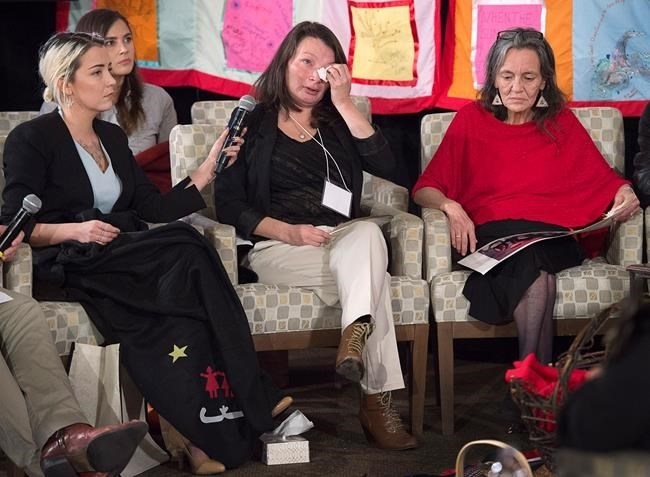
Deliah Saunders, left, Audrey Saunders, sisters of Loretta Saunders, and Miriam Saunders, right, her mother, testify at the National Inquiry into Missing and Murdered Indigenous Women and Girls, in Membertou, N.S. on Monday, Oct. 30, 2017. Loretta Saunders, an Inuk woman, was murdered in Halifax in February 2014.
Image Credit: THE CANADIAN PRESS/Andrew Vaughan
November 02, 2017 - 7:00 AM
OTTAWA - The federal government needs to set up a national police task force to investigate missing and murdered Indigenous women, commissioners heading a much-maligned inquiry into the crisis urged Wednesday as they blamed procedural red tape for a false start that delayed proceedings by eight months.
The commission — savaged in recent months by families and survivors disappointed in what they see as a lack of concrete action — released a 111-page report detailing its progress to date, while also calling for some sort of investigative body to re-open existing cold cases.
The inquiry is somewhat hamstrung by its own terms of reference, which allow it to refer cases to police only when new information is uncovered, chief commissioner Marion Buller told a news conference.
Families that have lived for generations with questions about what happened to their loved ones "do not fall neatly" within that box, Buller said, noting many want to know why investigations were halted or police didn't fully investigate promising leads.
"What we need to do is provide them with an opportunity or a venue to get the answers that they so desperately need," she said. "It is vital for their healing that they do find out."
Wednesday's report also calls on Health Canada to expand an existing support program for those who testify before the inquiry, and to keep it running "at a minimum" for the duration of the hearings.
"Many families and survivors who share their truths are reliving the pain of loss or violence," said commissioner Brian Eyolfson. "We have worked very hard to ensure that families and survivors have a safe place to share, but more support is needed, beyond what the inquiry can provide."
The inquiry didn't spell out what that would cost — nor did it say how much more time and cash will be required to complete its work.
Buller, who has publicly indicated she will make a formal request for more of both, said Wednesday she wants to get that request right so she doesn't have to do it more than once. But by citing the towering five-year Truth and Reconciliation Commission as a reference point, she hinted that the scale of her challenge could be even larger.
The TRC, which delved deeply into the legacy of Canada's residential school system, was focused exclusively on historical events. The missing-and-murdered inquiry is looking into tragedies both past and present, she noted.
"Indigenous women and girls are suffering violence," Buller said. "That somehow has become normalized, and that is a national tragedy."
The Liberal government, which earmarked $53.8 million and two years for the inquiry's work, has promised to make sure the commission gets what it needs to get to the bottom of the tragedy, while staying at arm's length.
The commission's mandate is to examine the root cause of violence against Indigenous women. An RCMP report detailing findings from 1980 to 2012 pegged the total number of victims at 1,181, adding 32 deaths and 11 disappearances to the totals in a 2015 update. All of those numbers are widely seen as conservative estimates, with experts saying the true total could well be much higher.
The inquiry got off to a rough start more than a year ago, and Wednesday's report laid the blame for those delays squarely at the feet of the federal bureaucracy. Red tape delayed everything from setting up proper phones and internet access, procuring office equipment and obtaining the basic materials staff members needed to simply do their jobs, it said.
The inquiry has also been hampered by having to follow the federal government's human resources, information technology and contracting rules, the report noted.
"We have faced several obstacles from a bureaucratic and procedural and policy perspective in getting our national inquiry up and running and mobilized all across Canada," Buller said.
Crown-Indigenous Affairs Minister Carolyn Bennett said Wednesday the Privy Council Office — the hub of public service support to the prime minister and cabinet — is working to rectify these problems, adding it has also set up a working group across all government departments.
"The commission is working in a very different way than traditional government processes and that we want to help in whatever way we can to get done," Bennett said outside the House of Commons.
Both the Conservatives and the NDP welcomed the call for a national police task force, and urged Bennett to heed the inquiry's advice and streamline the mechanisms necessary to assist the inquiry in its efforts.
—Follow @kkirkup on Twitter
News from © The Canadian Press, 2017